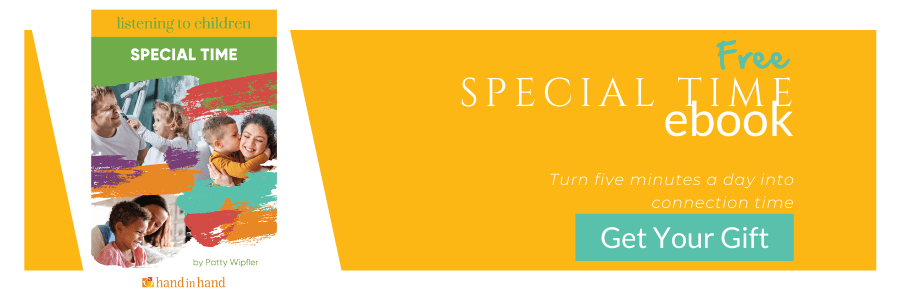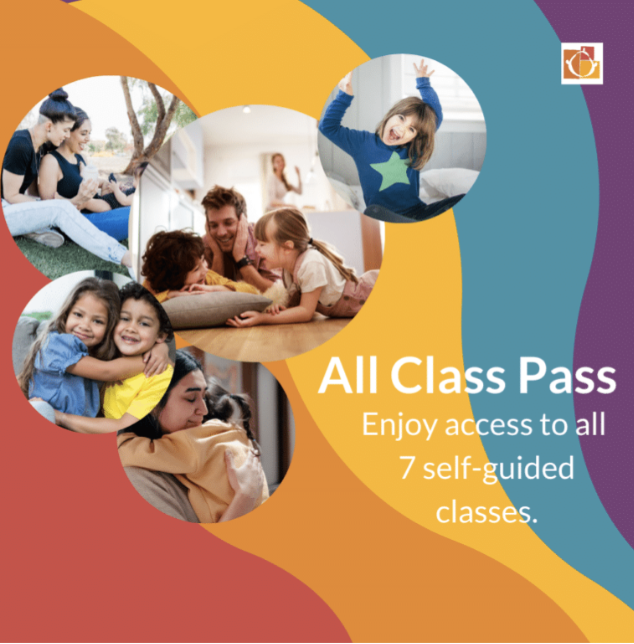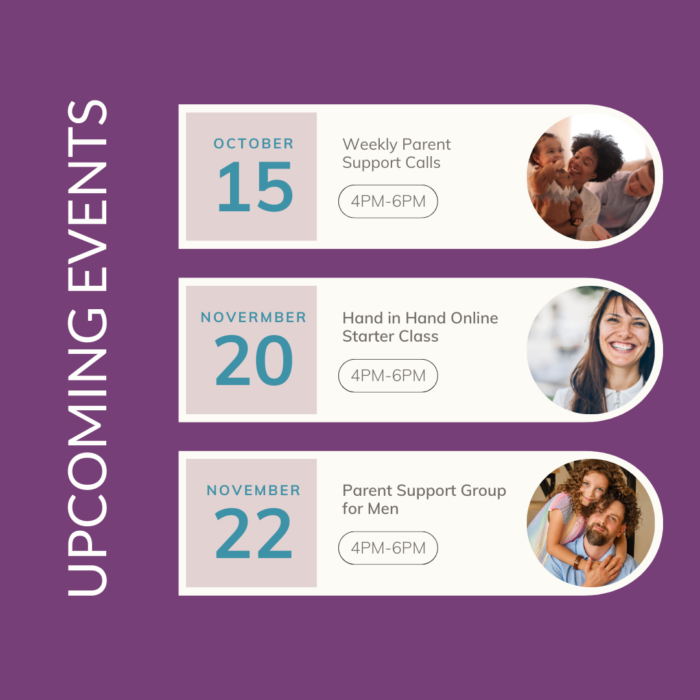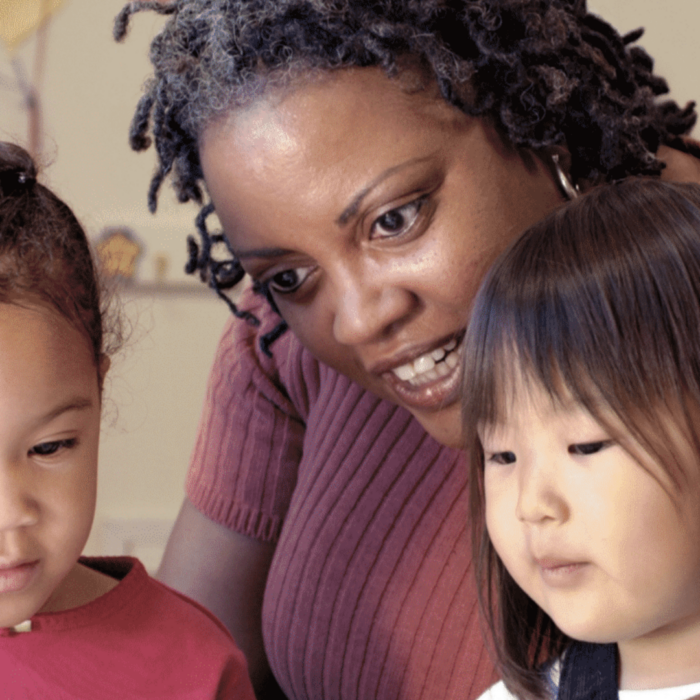In the swirl of every day life, stress regularly gets in the way.
We find ourselves torn between too many tasks. Our minds won’t stop. The news is so serious, and we take it on. Life IS serious.
And yet, we have kids.
Kids who don’t yet understand how it feels to have this weight on their shoulders – at least we hope not.
Still, with all these demands our patience wears thin and we lose it.
Which, of course, only makes us feel worse. Heavier, darker.
And yes, we KNOW we need to do self-care.
But, we still have those kids.
So by all means take that walk alone if you can. Journal if you wish. Definitely talk to your listening partner.
And don’t forget that sometimes our kids can teach us a few tricks.
And right now, they can teach us a mindfulness practice that will soothe the stress AND help us build the closer relationships we all crave, nested in warmth and security.
How Can Your Child Can Help You Get More Present In Your Parenting?
Kids know how to live in the moment. Just look at them play.
When kids play, they are truly living in the moment.
They are open to possibility. They focus all their senses on what they see, hear, smell and touch. And when we hold back from directing them, there are many benefits – for us, as well as them.
These brief moments where our kids are in control allows for a warm and safe space for children to direct their day, which can be useful in building confidence and resilience.
Play can also be a wonderful way for children to work through their lingering issues and make sense of things that have affected them, especially when laughter happens. Laughter is a powerful way to dissolve tension and restore a sense of wellbeing.
Following our children in play can be a mindfulness practice for us as parents too.
Mindful Play is Good For Parents Too
Mindful play creates a space where we, as parents, can:
- See what is holding our children’s fascinations, and perhaps muse why
- Delight in our children as they are, noticing what we enjoy and love about them in particular
- Shake off our adult responsibilities for a while and indulge in fun and laughter
- Get respite from urgency,
- A break in directing your child through the daily schedule
- A regular way to reconnect with your child and cherish that time
Just as with any kind of mindfulness practice, mindful play means relinquishing our leader role for a moment and being in the moment as time unfolds. It is about focus – on our children in this case – and a time to let other concerns go.
It is an awesome thing to be able to delight in our children’s wonder, their curiosity, and imagination – and maybe even regain some of that for ourselves – and it is entirely possible. Yet, slowing down and following kids in play can feel incredibly hard.
Learning to See Play As a Regular Practice in Mindfulness
- Offer to “help” build a tower?
- Make a character “do” something new and unrequested?
- Shoot all the goals or set out to win a game?
- You offer to show your child how it’s done, or suggest a “better” way?
These are all ways parents subtly begin to take control.
Understanding How Kids Use Play When They Have The Freedom to Lead
To overcome this, it can help to know better why kids benefit from leading their play. We often hear the term that a child’s work is play. It’s true. Children use play to make sense of the world – even if we don’t know what experiences they are working through exactly.
Giving kids the freedom to direct their play in our warm and open presence gives them the opportunity to play where they need to most.
Say you invite your child to play blocks, and he regularly knocks down the tower you painstakingly build. You might get an urge to tell him not to knock the tower.
But, what if last week at preschool, he accidentally knocked down a classmate’s tower, and the classmate became upset? It could be that your child is using this time with you to examine what it means to knock a tower down. Maybe he wants to try something that stung him earlier in your safe company.
What if your child asks you to kick a ball around, but gets grouchy every time you make the goal?
From the outside, the behavior may seem defiant, or bratty.
But what if your child has serious doubts about himself on the soccer field, and needs to win (against you) to feel that thrill just once or twice in a bid to recover from the feelings he has about letting his team down. What if he needs to build trust with you, by winning a few times, before he can let his guard down enough to receive skills instruction.
It can be hard to decipher why children might direct their play the way they do. The important thing is that we don’t actually need to try. What we can do is trust that they do know what they need to play and follow them in it. This is why your child being able to take the lead is a vital component of their play.
Getting Present in Play: Seeing Play As Daily Mindfulness Practice
We can also think of our play with our child as a regular practice in mindfulness. The ultimate way to skill up on letting go and focusing on the moment!
As this article outlines, there are several ways that play can be mindful, including the idea of encouraging openness. Being open to where the imagination takes you and your child is bonding. It also helps children to make discoveries, test boundaries, and get inventive in their play.
Building Mindful Play into Your Day
There are a few ways to incorporate play as a regular practice into your life. Some parents are encouraged by holding a “yes” day now and then, where they say yes to their children all day once in a while.
The Hand in Hand Parenting Tool of Special Time brings mindful play into a regular schedule for shorter bursts of time, say 10 minutes a day or every few days. You can read more about how to run Special Time as a regular practice here.
Good Guidelines for Mindful Play
- Build up slowly, a few minutes at a time if you find it hard to focus your attention on play.
- Listen carefully while your child sets up the play. (Sometimes an intricate set up is actually the play, although it may not seem like it.)
- Keep listening. Children often stop play, re-direct, and then pick up in a new direction as ideas come to them. Try and keep fluid!
- If you are not sure of their direction, it can be helpful to gently ask, “Like this?”
- You can and should still set limits if play gets aggressive or dangerous. For instance, if in a pillow fight your child bites in her excitement, pause for a minute, gently set the limit of no biting, and then move to resume play.
- If you feel your mind wandering, or feel tired, focus on the joy, intensity or the energy your child brings to the play.
What to Do When Play Feels Hard
- We face constant pressure to get things done in our adult life, which can feel more important than play.
- We may undervalue the role of playing and letting a child lead play because no-one played in the same way as us as children
- Following a child in play may dredge up less than fond play memories from your own childhood
- It can feel unnerving not to know what’s coming next
- We may feel too tired or agitated to play
Just as you would with other mindfulness exercises, acknowledge these thoughts and feelings as they happen, and then return your focus to the play.
Work up the amount of time you spend playing as your comfort level grows. If you have a Listening Partner, someone who can listen to you without judgment, use your time to bring up some of the thoughts that come up in play and work through why you have them.
This act of clearing space for the feelings you have has a rebound effect, often loosening up the resistant feelings you have around play. You can learn more about listening partnerships here, and you can hear a demonstration in this episode of the Hand in Hand Podcast.
Children who spend time playing and leading play with parents or adult caregivers have more opportunities to build confidence and resilience. Regular play with your child “in charge” also fosters trust and strong and lasting connections.
You’ll attune to your child more easily, and learn more about how our children make choices too.
Let us know if you have tried using play as a practice in mindfulness. What does your child like to do? How does it feel for you to let go?
More on the Power of Play and Connecting with Children
If this kind of present play is new to you, get this guide now on how it works and how to set it up for success.
Read 4 Types of Limits That Children Need
If playing seems hard read this post to determine why: What If I’m Just Not A Playful Parent?
Don’t forget Listening Time is the ultimate self-care tool for parents. Find out more here.





